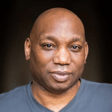
Episode 479: Jeff Sharlet and Finding Real Toads in Imaginary Gardens
"You're an outsider. And as you linger in that space, you start to become an insider ... but you're still an outsider. Don't forget that, even though you know more about it, you're an insider and an outsider," says Jeff Sharlet about when he's reporting on, say, far-right religious groups.
OK, we’ve got Jeff Sharlet, which is pretty stunning when you think about it. I mean, this guy is the author of The Undertow: Scenes from a Slow Civil War, The Family, among other books. He often covers the far right and far-right fundamentalism and what’s he’s been able to document is scary and often unsettling. We don’t dig too much into that, because mainly we just talk about doing this kind of work. It was really a fun and illuminating conversation and I’m pretty stoked.
He teaches writing and creative nonfiction at Dartmouth College. That was where I desperately wanted to go to school. I was set to be their starting shortstop, but I couldn’t get my goddam SATs above remedial and thus I attended good ol’ UMass … back in the late 1990s, if you could funnel a beer in five seconds you got a scholarship #yolo
In this episode, Jeff and I riff about:
- His key influences
- Treating your book badly as a way of treating it well
- Using your outsiderness to your advantage
- His love of sportswriting, or interest in sportswriting, despite not following sports
- And real toads in imaginary gardens
You can learn more about Jeff and his work @jeffsharlet on Substack and his newsletter there called Scenes from a Slow Civil War … I admire people like Jeff who are just so damn smart in how they articulate things seemingly on the fly. Meanwhile, ya boi BO sounds about as coherent as a chimpanzee.
Newsletter: Rage Against the Algorithm
Show notes: brendanomeara.com



















